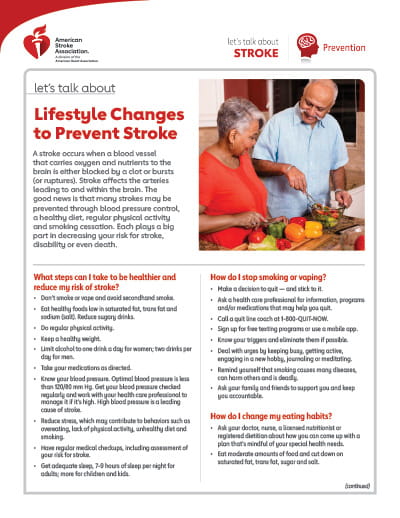Let’s Talk About Lifestyle Changes to Prevent Stroke
 A stroke occurs when a blood vessel that carries oxygen and nutrients to the brain is either blocked by a clot or bursts (or ruptures). Stroke affects the arteries leading to and within the brain. The good news is that many strokes may be prevented through blood pressure control, a healthy diet, regular physical activity and smoking cessation. Each plays a big part in decreasing your risk for stroke, disability or even death.
A stroke occurs when a blood vessel that carries oxygen and nutrients to the brain is either blocked by a clot or bursts (or ruptures). Stroke affects the arteries leading to and within the brain. The good news is that many strokes may be prevented through blood pressure control, a healthy diet, regular physical activity and smoking cessation. Each plays a big part in decreasing your risk for stroke, disability or even death.
What steps can I take to be healthier and reduce my risk of stroke?
- Don’t smoke or vape and avoid secondhand smoke.
- Eat healthy foods low in saturated fat, trans fat and sodium (salt). Reduce sugary drinks.
- Do regular physical activity.
- Keep a healthy weight.
- Limit alcohol to one drink a day for women; two drinks per day for men.
- Take your medications as directed.
- Know your blood pressure. Optimal blood pressure is less than 120/80 mm Hg. Get your blood pressure checked regularly and work with your health care professional to manage it if it’s high. High blood pressure is a leading cause of stroke.
- Reduce stress, which may contribute to behaviors such as overeating, lack of physical activity, unhealthy diet and smoking.
- Have regular medical checkups, including assessment of your risk for stroke.
- Get adequate sleep, 7-9 hours of sleep per night for adults; more for children and kids.
How do I stop smoking or vaping?
- Make a decision to quit — and stick to it.
- Ask a health care professional for information, programs and/or medications that may help you quit.
- Call a quit line coach at 1-800-QUIT-NOW.
- Sign up for free texting programs or use a mobile app.
- Know your triggers and eliminate them if possible.
- Deal with urges by keeping busy, getting active, engaging in a new hobby, journaling or meditating.
- Remind yourself that smoking causes many diseases, can harm others and is deadly.
- Ask your family and friends to support you and keep you accountable.
How do I change my eating habits?
- Ask your doctor, nurse, a licensed nutritionist or registered dietitian about how you can come up with a plan that’s mindful of your special health needs.
- Eat moderate amounts of food and cut down on saturated fat, trans fat, sugar and salt.
- Bake, broil, roast and boil foods instead of frying.
- Read nutrition labels on packaged meals. Look for the AHA Heart-Check mark on packaging.
- Eat more fruits, vegetables, whole grains, healthy sources of protein, low-fat dairy and healthy oils.
- Use a diary, or if available, a mobile app to track what you’re eating. Try to incorporate healthy substitutions or alternatives.
What about physical activity?
- Set goals and keep reaching for them. Gradually increase your activity to gain even more health benefits.
- Throughout the week, try to do 150 minutes of moderate-intensity physical activity, 75 minutes of vigorous-intensity physical activity, or a combination of both.
- Moderate-intensity physical activities include a brisk walk or water aerobics. Vigorous-intensity activities could include running, hiking or cycling.
- Also, strive for moderate- to high-intensity musclestrenghtening activity, such as resistance bands or weights, on at least two days per week.
- Short on time? Don’t just skip it; instead, break up your activity into smaller times to fit your schedule.
- Look for even small chances to be more active. Take the stairs instead of an elevator, walk to the mailbox, and park farther from your destination.
- If you have a chronic medical condition, check with your health care professional before you start an exercise program.
How can I learn more?
- Call 1-888-4-STROKE (1-888-478-7653) or visit stroke.org to learn more about stroke or find local support groups.
- Sign up for our monthly Stroke Connection e-news for stroke survivors and caregivers at StrokeConnection.org.
- Connect with others who have also had an experience with stroke by joining our Support Network at stroke.org/SupportNetwork.
Do you have questions for your doctor or nurse?
Take a few minutes to write down your own questions for the next time you see your health care professional. For example:
What stroke risk factors can I modify?
What kind of physical activity can I do safely?
We have many other fact sheets to help you make healthier choices, manage your condition or care for a loved one.
Visit stroke.org/LetsTalkAboutStroke to learn more
© Copyright 2022 American Heart Association, Inc., a 501(c)(3) not-for-profit. All rights reserved.
American Stroke Association is a registered trademark of the AHA. Unauthorized use prohibited. DS19555 6/22